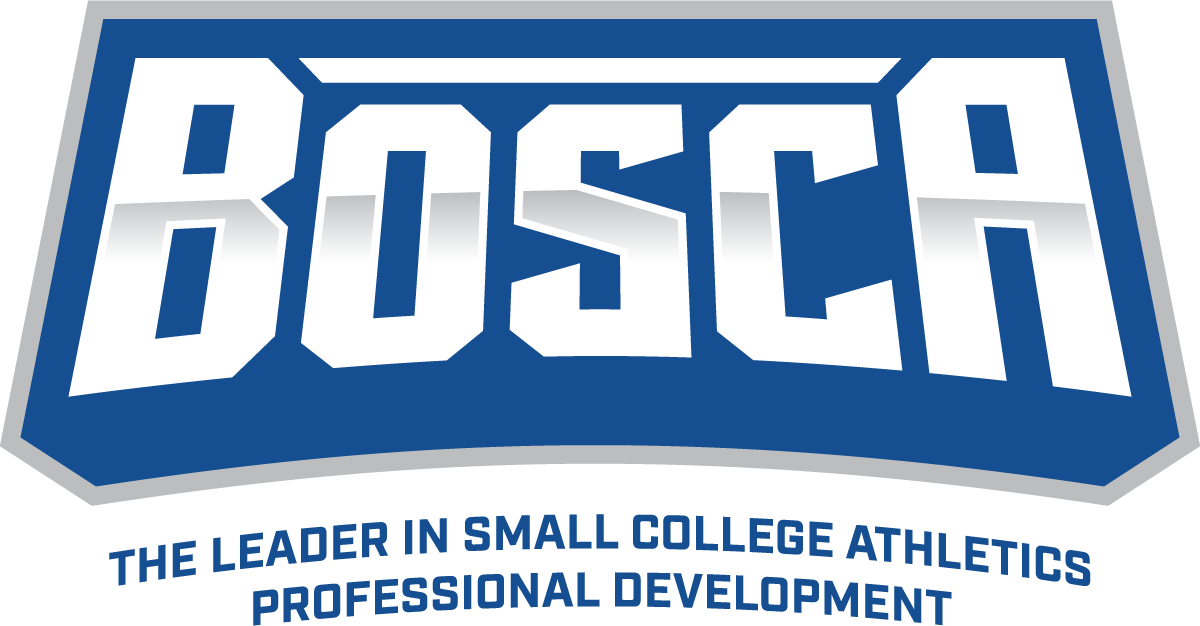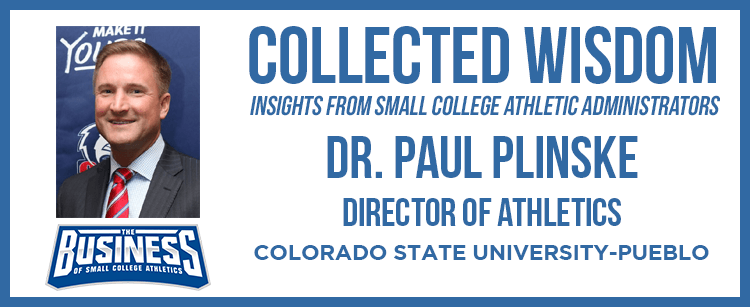Collected Wisdom - Paul Plinske
Athletic Director - Colorado State University - Pueblo
Collected Wisdom is an interview series featuring insights from small college athletic administrators. Our thanks this week to Dr. Paul Plinske, Athletic Director at Colorado State University - Pueblo for sharing his time and thoughts.
How did you get started in College Athletics?
My journey into college athletics really started at the University of Illinois where I served as a graduate assistant in the football program. Assisting with recruitment efforts, camp and clinic operations and the overall day-to-day operations of an NCAA Division I institution helped open my eyes to college athletics and the role I can play in the lives of student-athletes.
You have a Ph. D in Sports
Administration. What inspired you to
complete your Ph. D and how does it impact you professionally?
My mentor at the University of Illinois encouraged me to attain a Ph.D., so I enrolled at the University of Minnesota and fully engrossed myself in teaching, research and service. For three years, I served as a teaching assistant in the Department of Kinesiology while working in the athletic department and writing my dissertation, which is entitled: “Athletic Fund Raising: A Detailed Analysis of NCAA Division III Member Institutions.” Having a Ph.D. has enabled me to engage in scholarly activity, meaningful interaction with faculty and advance within higher education. There is no doubt in my mind that attaining a Ph.D. at the age of 29 enabled me to move in to the role of an athletic director by age 34.
You spent 5 years as an Associate AD before
becoming an AD. What steps did you take
in the first 5 years that prepared you to lead a department of your own?
The business of college athletics is all about people, so my first step was to build a professional network, both internal and external to the university. The second step was to examine every possible way to provide ‘value’ to the university. I never made it about me, but instead, made my work about adding value to the student-athletes, coaches and staff. The third step was to learn as much as I could about every aspect within a college athletic department. Everything from personnel decisions to compliance and Title IX to budgeting, marketing and development were part of my learning process. The fourth step was to start compiling my professional portfolio. I developed my resume, included contract appointments, work documents and anything that could tell “my story” to prospective employers. Finally, I enjoyed every minute being the “second in charge”. Moving to the AD seat is a huge undertaking. It’s a lonely world. I see many assistants who are anxious to move up in their careers. “Be patient. Your time will come”, I tell them. Enjoy where you are and make the most of every opportunity to learn.
What advice do you have for Asst/Assoc AD’s
that aspire to become Athletic Directors?
What steps should they take to prepare themselves for this role and
position themselves for opportunities that arise?
My best advice to any aspiring athletic directors is to build meaningful relationships (e.g., network); find ways to add ‘value’ to your current institution or workplace; learn as much as you can about all aspects within college athletics and higher education; build your portfolio and, finally, BE PATIENT.
You spent 14 years working at D3 institutions
(Wisconsin La Crosse and Wisconsin Whitewater) before moving to a D2 institution
(Nebraska Kearney). What inspired you to
make this move?
The challenge to work at a higher level, with bigger budgets and the ability to offer athletic scholarships, was a huge appeal to me and were my main reasons for pursuing a position in D2. Plus, I was fortunate to have won nine national titles as a Division III athletic director and wanted to win a title in D2. Ultimately, I’m driven to attain excellence, so what better level than Division II to work toward that goal.
Were there major differences in leading a
D2 department vs. leading a D3 department?
First of all, Wisconsin Whitewater operated and had visions of a higher level than Division III. I’m not saying we were going to move to Division II, but we knew we had the infrastructure and support to make national dominance a regular occurrence. That said, moving to Division II was a seamless transition for me, but there are major differences, especially with scholarship allocations, the philosophy of regionalization and competitiveness within Division II. I’ll also add that the Mid America Intercollegiate Athletics Association (MIAA) was an incredibly competitive league, so moving to an institution that was in its early years within this league was a huge undertaking.
You have been successful raising/generating
revenue to the tune of approximately $20 million during your career. What are the keys to success in generating
revenue in small college athletics?
The lifeblood of small college athletics is fund raising and in our business, it’s essential that an athletic director understands how to effectively raise money to support their programs. My research and experiences have revealed that relationships are key to successful fund raising. Relationships with the university’s advancement office and with influential donors are mandatory. Without these in place, all else fails. I like to think of fund raising by using the acronym P.E.A.L. – Plan, Engage, Ask and Love. It’s important to plan for effective fund raising, whether that means annual or capital campaigns, corporate sponsorships or special events. Engaging alumni and donors is essential to the process, but one must be willing to ask for support. Providing a compelling reason for donors to give will make “the ask” even easier. Lastly, and most important, there must be great care and concern (e.g., love) given to alumni and donors. Without PEAL in place, successful fund raising really isn’t possible.
Most recently, you faced revenue shortages
at Nebraska Kearney that led to budget cuts and the elimination of 3 sports
programs. What went into this decision?
First of all, this was the most painful
experience of my professional career. Standing in front of 56 male
student-athletes and telling them that their sport would be discontinued is
something I will never forget. In hindsight, I am most disappointed that we
didn’t have a chance to engage our coaches, staff, alumni and donors in a
conversation about “saving” these programs. At the time, it was evident that
budget cuts were necessary, especially with downward enrollment cycles and
State support being pulled, but Athletics holds a special place within the
hearts of alumni and donors. Providing them with an opportunity to give is
something that cannot be taken for granted. In the end, decisions to cut sport
programs are made with many variables in mind. Title IX implications, operational,
personnel, facilities, travel, and increased travel and missed class time in
sports that lack opportunity for home competitions due to spring climate and
weather are variables that played a role in the decision-making process. I would encourage administrators to be
committed to transparency and communication during tough budget circumstances.
People will understand and supporters will make surprising moves to step up
when it is least expected.
The decision to cut 3 sports was made early
in the year, in some cases before the season (baseball) had begun. Why did you make the announcement when you
did and what impact, if any, did the timing have?
There is never a good time to cut a sport program. At UNK, the announcement was made for several reasons, mainly to give the student-athletes a chance to find alternative opportunities, but also to be done in conjunction with System-wide budget cuts in Lincoln and Omaha. The timing had an adverse effect on our alumni and donors, but our coaches and student-athletes handled the entire circumstance very well. I applaud them for their professionalism and forward-thinking. It was a very difficult time, one that will take years to recover from, but I’m most proud of how people handled themselves.
Recently you started a new position as
Athletic Director at Colorado State – Pueblo.
Did the challenges you faced at UNK play any role in your moving on to
CSUP?
The challenges we faced at UNK are not unique just to that school, so that wasn’t the reason I left for CSU-Pueblo. The reason I left for CSU-Pueblo is because I wanted to work for President Tim Mottet because I believe in his vision and want to help him advance CSU-Pueblo. Additionally, he is offering the athletic director an opportunity to serve as a valued member of President’s Cabinet and use my skills to bolster a university system, institution and athletic department.
What are your priorities in your first 100
days at CSUP?
My first priority is to engage with the people and to listen and learn. I know I need to be patient about impacting change, but I will work hard to create a unified, compelling purpose for our department; look ahead and see opportunity; seek out what’s not working and strive to make changes; promote calculated risk-taking; and look for boundary-seeking opportunities.
What is your favorite part of your job?
My favorite part, by far, is engaging with student-athletes and supporting them in their competitive, classroom and community-engagement endeavors. I’m drawn to the competitive spirit of sport and love what coaches do on a daily basis, but the energy brought to a campus by students and student-athletes is what makes college so special. I believe I have the best job in America and I am proud to say that I’m focused on the student-athlete and their experience.
What is the biggest challenge in your job?
My biggest challenge is to curb my competitive drive with limited resources. I want to buy everything in sight, build amazing new facilities, provide the most I can for our student-athletes and coaches and win. I love traveling to away competition and national conferences because I’m given a chance to analyze and dream about what I can “bring home.” Reality often sets in, especially in Division 2 and 3, but something great can happen with hard work, dedication and persistence. These are traits that are central to my core as an athletic director and will help me overcome limited resources.
What are 1-2 qualities that
you look for when hiring a head coach?
Character and competence are two essentials that I look for when hiring a staff member, especially a head coach. Without these two qualities in place, I do not believe that a coach can be successful.
What advice do you have for
young people that are looking to start a career in college athletics?
First of all, find a mentor. Connect with someone who can guide you through your professional career. Second, make sure your education and experiences align with your professional aspirations. Both are equally important and essential for a person in college athletics. Third, make sure to make it a point to provide value to an institution. This can come in many ways, but is necessary in order to advance in this profession. Lastly, work hard, but be patient. Again, your time will come.
How do you balance your
personal and professional life?
Balancing the personal and professional life of an athletic director is a tremendous challenge. I often find myself working early and staying late. Working on the weekend is a common occurrence for any person in college athletics. It’s important that you have a supportive “significant other” and are able to create a high level of communication about work demands. Your spouse, significant other or friend can help you find balance in your work. Empower that person to tell you when to stop and disengage. Above all, find a way to put the cell phone away for a few hours. I’ve found this to be my biggest struggle and the most irritating to my wife and children. Putting the cell phone away means putting work down and establishing balance in life.
You have attended the Business
of Small College Athletics workshop in the past. What would you tell someone that is
considering attending?
Everyone in small college athletics needs to make a point to attend BOSCA. I found the conference incredibly enlightening and empowering. The location is consistent, the content is highly relevant and the networking opportunities are fantastic. I would highly recommend attendance at BOSCA to anyone in our profession. It’s my hope to return again soon so I can learn from our outstanding colleagues in this profession.




